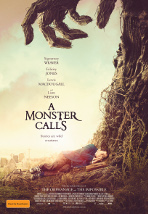A Monster Calls (film) book and screenplay by Patrick Ness

Focus Features, 2016, released in Australia 2017
(Age: 12+) Highly recommended. Fantasy, Monsters, Death, Cancer, Bullying, Acceptance. Conor (Lewis MacDougall) screams as he falls out of bed, clutching a hand slipping from his grasp. The clock shows 12.07 and he knows it is the old nightmare. His mum (Felicity Jones) is still asleep when he leaves for school the next morning, and he drags his feet knowing what waits. The bully is relentless, but it is Conor's invisibility which is most hurtful. No one speaks to him, and his teacher talks in a soft voice, offering help. But no one can.
Conor's mother has cancer and sleeps most of the time. When her mother (Sigourney Weaver) comes to stay, Conor does not welcome this bossy interfering woman. Conor becomes more angry when his absent father (Toby Kebbell) arrives from America, full of promises. But when he must live with his grandmother on Mum's return to hospital, his anger builds.
The only thing that knows how Conor feels is the monster who fills his room at night. The yew tree by the church, the same one his mother watches from the window, tells him three stories, each drawing Conor to seeing both his father and grandmother in a different light, and to admit to himself the truth of his mother's illness.
The book, first published in 2011, written by Patrick Ness after an idea sketched out by the late Siobahn O'Dowd, won the Kate Greenaway Medal for its illustrator, Jim Kay, and the Carnegie Medal. Now directed by J A Bayona (Orphanage and Impossible) the film radiates with repressed anger. Conor is unable to admit the truth. His anger manifests itself in smashing his grandmother's front room, and putting the bully into hospital.
Ness has written the screenplay for this film, concentrating on the four main characters and the monster, the yew tree, as it reaches into the dark recesses of the mind, coping with the imminent death of someone very close. The brooding presence of the yew tree, pulling up its roots and striding into Conor's bedroom is mesmerising, his fearsomeness tempered by his voice (Liam Neeson), at once solicitous and fatherly as he tells Conor the stories. The claustrophobic feel of the film, intensified by the acton restricted to four rooms, Conor's house, Grandmother's house, the school room and the hospital room, while going outside the chilling presence of the monster fills the screen. The viewer hardly breathes, intent on seeing what is behind the stories, and how Conor will accept it.
A highly emotive fantasy thriller about a boy's guilt at his mother's disease, the film has further developed the brooding atmosphere of the book, and would suit an audience of teens and adults.
Fran Knight